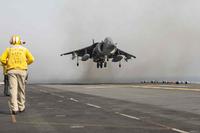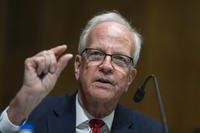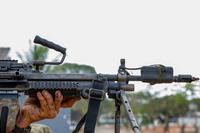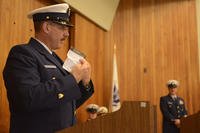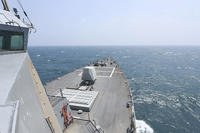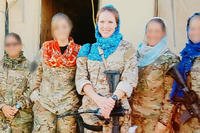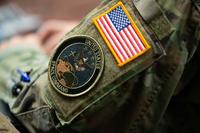With more than five times the number of prisoners than the detention facility on Guantanamo Bay, the U.S. jail next to Bagram Airfield is just one of many factors affecting the degree to which U.S. forces remain in Afghanistan after 2014.
President Obama and Afghan President Hamid Karzai will meet next week in the White House to discuss the fate of the prison, the pace of America’s withdrawal, and the size of the U.S. presence in Afghanistan after 2014.
“The first thing is to establish how many will stay in Afghanistan” after 2014, said George Little, the chief Pentagon spokesman. Karzai has warned that he will not approve a troop agreement unless all Afghans in U.S. custody are turned over to his jurisdiction.
A complicating factor is the U.S. custody of suspects who allegedly committed insider attacks against allied troops. These attackers, who often posed as Afghan police officers and soldiers, killed U.S. and allied troops at a record rate in 2012.
The number of prisoners detained at the high-security, $60 million detention facility is a tightly protected figure. Afghan officials, prison administrators, International Security Assistance Force spokesmen, and senior Pentagon officials all have repeatedly declined comment in recent weeks on how many are held at the facility located next to Bagram Airfield. U.S. Combined Joint Interagency Task Force 435 is the unit assigned to run the detention facility.
“As a matter of operational security, we do not discuss numbers of detainees transferred or currently held by CJIATF 435 or U.S. Forces,” said Col. Thomas Collins, an ISAF spokesman in Kabul.
However, President Obama discussed the numbers in December. In one of his required periodic reports to Congress under the War Powers Act , Obama wrote on Dec. 14 that “United States Armed Forces are detaining in Afghanistan approximately 946 individuals under the Authorization for the Use of Military Force (Public Law 107-40) as informed by the law of war.”
The vast majority of the 946 are detained by CJIATF 435. A small number of recently captured prisoners are kept at local commands until they can be transferred to the detention facility next to Bagram in the Parawan province.
Obama’s report did not state whether the prisoners were captured on the battlefield or were taken into custody for other reasons. “We do not talk about individual detainees and we do not discuss the provenance” of the prisoners’ presence in custody, said Lt. Col. Todd Brasseale, a Pentagon spokesman.
Since 2005, Karzai has demanded that prisoners held by the U.S. and the NATO coalition be turned over to Afghan jurisdiction -- with the exception of foreign nationals who were captured in military operations.
About one-third of the 946 in Parwan are thought to be foreign nationals, mostly Pakistani but also Yemenis and Saudis, Brasseale said. Karzai has said that he does not want custody of the foreign nationals.
In November, Karzai called for "urgent actions” by the U.S. to release the prisoners in Parawan to his control. He said in a statement that the U.S. did not "have the right to run prisons and detain Afghan nationals in Afghanistan."
Karzai threatened to cancel the already difficult negotiations on a post-2014 presence for U.S. forces. A main sticking point to those negotiations involves “status of forces” -- whether U.S. troops in the residual force would be immune from Afghan law. Iraq’s refusal to provide immunity forced the U.S. to remove military forces from Iraq.
Karzai’s spokesman, Aimal Faizi, has said that more than 70 detainees held by the U.S. under “administrative detention” have already been cleared of wrongdoing by Afghan courts. He said the U.S. had no justification for continuing to hold them since administrative detention was not recognized under Afghan law.
"There are some prisoners found innocent by the court who are still in custody,” Faizi said. “This act is a serious breach of a memorandum of understanding."
The U.S. has not faced the same issue at Guantanamo, where the host nation of Cuba has not claimed jurisdiction of the alleged terrorists held on the naval base.
Under U.S. court rulings and acts of Congress, many of the 166 prisoners at Naval Station Guantanamo Bay have been cleared to return to their own countries or to a third-party nation willing to take them pending agreements on their continued monitoring and detention.
The rest of the prisoners at Gitmo, where the first 20 captives in the war on terror arrived in January 2002, can be tried before a military commission. There is no such prospect for the prisoners next to Bagram.
“We have never held a military commission in Afghanistan and we don’t expect there will be one,” Brasseale said.
A senior Pentagon official, speaking on background, said “our goal, eventually, is to turn all of the prisoners over” to the Afghans, but the official added that “there is not a mechanism currently in place” for achieving the goal.
The Parwan prisoner impasse has left the U.S. in a legal and political bind under international law, the Geneva Conventions and the law of armed conflict, said Gary Solis, a former Marine Corps Judge Advocate General.
“We are simply disregarding agreements with the Afghans,” said Solis, an adjunct professor at Georgetown University who also teaches the law of war at West Point. “There is no guidebook for this, no precedent for this situation.”
For years, Parwan was a key factor in U.S. worldwide intelligence gathering operations, as interrogators grilled insurgents captured on the battlefield for information on Al Qaeda and the war on terror.
In August 2009, Army Gen. Stanley McChrystal, then the coalition commander as head of the International Security Assistance Force, said Parwan was at risk of becoming a “strategic liability” for the U.S. McChrystal said the extrajudicial detentions at Bagram were eroding Afghan support for the allies.
Under a Memorandum of Understanding between the U.S. and the Afghan governments reached last March, the U.S. was to have turned over all of the prisoners in September. This led to an awkward change of command ceremony at Parwan on Sept. 9, which Army Lt. Gen. Keith Huber, commander of CJIATF 435, declined to attend.
The U.S. transferred about 3,000 prisoners to the Afghans. The U.S. held back more than 50 who were captured before March along with hundreds of others captured by U.S. forces between March and September.
The Memorandum of Understanding called for the U.S. to turn over the entire Parwan jail to the Afghans, but the U.S. retained a section closed off to the Afghans.
In the dispute over control of the Parwan facility, the U.S. stance has been that the Afghans might not be ready to manage the jail and that the corrupt Afghan justice system might hold trials that would result in the release of dangerous prisoners.
In its latest “Report on Progress and Security and Stability in Afghanistan” to Congress last month, the Defense Department said “the Afghan judicial system continues to face numerous challenges.”
The system is riddled with “systemic corruption at all levels resulting in a lack of political will to pursue prosecutions against many politically connected individuals,” the Defense Department report said.
U.S. and Afghan officials declined comment on whether suspects in insider attacks by Afghan soldiers and police on coalition forces that have killed at least 62 allied troops last year were being held back for fear they would be turned loose. Several field commands said perpetrators in the attacks had been sent to Parwan.
One such suspect was a 15-year-old boy allegedly working for the Taliban. A Marine spokesman said the boy had been sent to Parwan after he killed three Marines in southwestern Helmand province in August. According to the Long War Journal, at least 22 suspects in insider attacks have been captured, but U.S. and Afghan officials declined comment on their status.
“No one is ever charged with anything so it’s difficult to know what they’re being held for” at Parwan, where prisoners “are not afforded even the minimal protections that the people at Guantanamo have,” said Heather Barr, a researcher in Kabul for Human Rights Watch, an independent advocacy group.
Barr said she had attended sessions of the Detention Review Boards set up by the U.S. to determine the status of the prisoners, but the boards have never led to specific charges against prisoners.
“We know of only one case that has gone to trial,” Barr said, and that case involved a prisoner, Abdul Sabor, who was captured by the French and handed over to the Afghans. Sabor, who allegedly killed five French troops in an insider attack last January, has been sentenced to death and his case is now under appeals in the Afghan courts, Barr said.
Barr said the U.S. was “trying to bully the Afghans into setting up an administrative detention system” for high value prisoners that would allow them to be held indefinitely without the risk of a trial that might set them free.
“The Afghan government has said it’s not going to do administrative detention, it’s unconstitutional under Afghan law,” Barr said.
British officials have argued against transferring prisoners to the Afghans. In a November letter to Parliament, British Defense Secretary Phillip Hammond wrote that he was canceling future transfer of insurgents captured by British forces to the Afghans on grounds that they might be tortured.
“There are currently reasonable grounds for believing that UK-captured detainees who are transferred to Lashkar Gah would be at real risk of serious mistreatment," Hammond said in a reference to the Afghan-run jail in the southwestern Helmand province capital of Lashkar Gah.
U.S. Congressional leaders have expressed concerns that Afghan prisoners who still pose a threat might be released. In an August statement, Rep. Howard McKeon (R-Calif.), chairman of the House Armed Services Committee, cited the release of a “high-value terrorist” by Iraq over U.S. objections.
“We call upon the President and Secretary of Defense (Leon) Panetta to extend all efforts to ensure that this tragic mistake is not repeated with terrorists currently in U.S. custody in Afghanistan,” McKeon said.
The central question on the Afghan prisoner issue was whether “the U.S. courts are going to take notice of what’s going on in Afghanistan” as they did in setting minimal habeas corpus rights on the charges against prisoners in Guantanamo, said Donald Huber, a former Navy judge advocate general and now dean of the South Texas College of Law.
“I don’t think they will. You could make the argument that it’s even a darker black hole” in Afghanistan in terms of international law than it was in Guantanamo, Huber said. “I don’t see the U.S. courts intervening. If anything, it’s a tougher problem than Guantanamo.”




